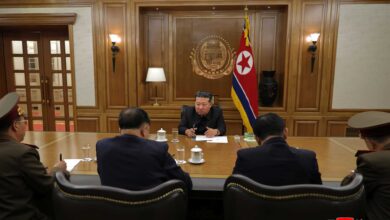In January 1995 a devastating earthquake cut a swathe through the region from Osaka to Kobe, Japan, inflicting heavy human and material losses on the compatriots of Chongryon (General Association of Korean Residents in Japan–Tr.).
Though bereft of their relatives and property overnight, they pooled their efforts to pull through the natural calamity. The message of sympathy sent by Kim Jong Il infused them with vigour and courage. Their soaring morale was the envy of the Koreans who were affiliated with the pro-south Korean Federation of Korean Residents in Japan and other Koreans who did not belong to any organizations. Sadly, they had nobody to turn to in adversity. They were yearning for a saviour.
To their amazement, however, the relief funds sent from the DPRK were distributed equally among all the Korean victims, irrespective of their organizational affiliation.
The officials of Chongryon explained who was helping them:
On January 22, some days after he sent the message of sympathy, Kim Jong Il summoned officials concerned and told them about the critical situation in the affected region.
He said:
“We should not remain onlookers to the misfortune and sorrow of the officials of Chongryon and other compatriots living abroad.
“You should consider measures for sending relief funds to the compatriots of Chongryon who have sustained damage by the recent earthquake.”
“You mean relief funds?” exclaimed an official.
“Yes, I mean relief funds,” asserted the General.
The officials had presumed that they no longer needed to pay concern to the victims because Chongryon, inspired by his message of sympathy, was pushing forward a campaign to encourage its organizations to help the victims on the principle of filling one another’s needs. As the country was facing great economic difficulties, none of them had ever thought about relief funds.
According to Kim Jong Il’s instructions, they worked out measures for sending a certain amount of money. But he asserted that they must not spare anything because the money would help relieve the Korean compatriots of their misfortune and pain and that a large sum should be sent even though the people in the homeland had to eat gruel or go hungry. He underlined that the money should be distributed also among the Koreans who were affiliated with the pro-south Korean Federation of Korean Residents in Japan and other compatriots who did not belong to any organizations.
After listening to the Chongryon officials’ story, they all shed tears of gratitude. They felt shy as they had turned their backs on Chongryon because of differences in ideology and organizational affiliation. Moreover, they were well aware of the economic difficulties facing the DPRK.
They felt heartfelt admiration for the General who showed close concern for the compatriots of the homogeneous nation in disregard of their past. They keenly realized that blood is thicker than water.
Indeed, Kim Jong Il was a benevolent leader who devoted his all to relieving his compatriots of their sufferings and removing distrust and confrontation between them.

